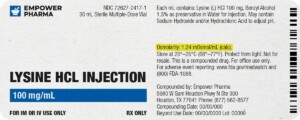If you know or suspect that you are allergic to gonadorelin, tell your doctor or pharmacist before using it. Even if you are not allergic to gonadorelin, this medication may contain inactive ingredients that can cause allergic reactions or other problems. Therefore, tell your doctor or pharmacist if you have any other allergies before using gonadorelin.[6]
It is also important to inform your doctor or pharmacist of your medical history before using gonadorelin, especially if you’ve had kidney disease, pituitary tumors (such as prolactinoma), ovarian cysts or cancer of the reproductive organs (breast, ovary, uterus, etc.).[6]
Tell your doctor or dentist about all of the medications and supplements you use (prescription medication; over-the-counter medication; vitamin, mineral or herbal supplements; etc.) before having surgery.[6]
Gonadorelin may cause multiple births (such as twins, triplets) in patients capable of becoming pregnant. It is important to discuss the risks and benefits of having such pregnancies with your healthcare provider. Gonadorelin may be used during the first trimester of pregnancy as directed by your healthcare provider. If you become pregnant or think you may be pregnant while using this medication, tell your doctor immediately.[6]
Ovarian hyperstimulation syndrome (OHSS) is a severe side effect that may happen to some patients with ovaries who use this drug. Talk to your healthcare provider immediately if you experience shortness of breath; very upset stomach, throwing up, or diarrhea; severe stomach pain or bloating; significant weight gain; or change in how much urine you pass when going to the bathroom.[7]
Though it is rare, patients who have been used gonadorelin to help them get pregnant have developed ovarian cancer. However, it is not clear if the medication led to these cases of ovarian cancer or not. Talk to your healthcare provider if you have questions or concerns about this.[7]

 Testosterone Cypionate / Testosterone Propionate Injection
Testosterone Cypionate / Testosterone Propionate Injection DHEA Capsules
DHEA Capsules Testosterone Cream
Testosterone Cream Enclomiphene Citrate Capsules
Enclomiphene Citrate Capsules Oxandrolone Tablets
Oxandrolone Tablets Testosterone Nasal Gel
Testosterone Nasal Gel Anastrozole Capsules
Anastrozole Capsules Oxandrolone Troches
Oxandrolone Troches Testosterone Vaginal Cream
Testosterone Vaginal Cream Ondansetron Tablets
Ondansetron Tablets